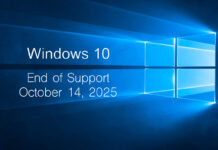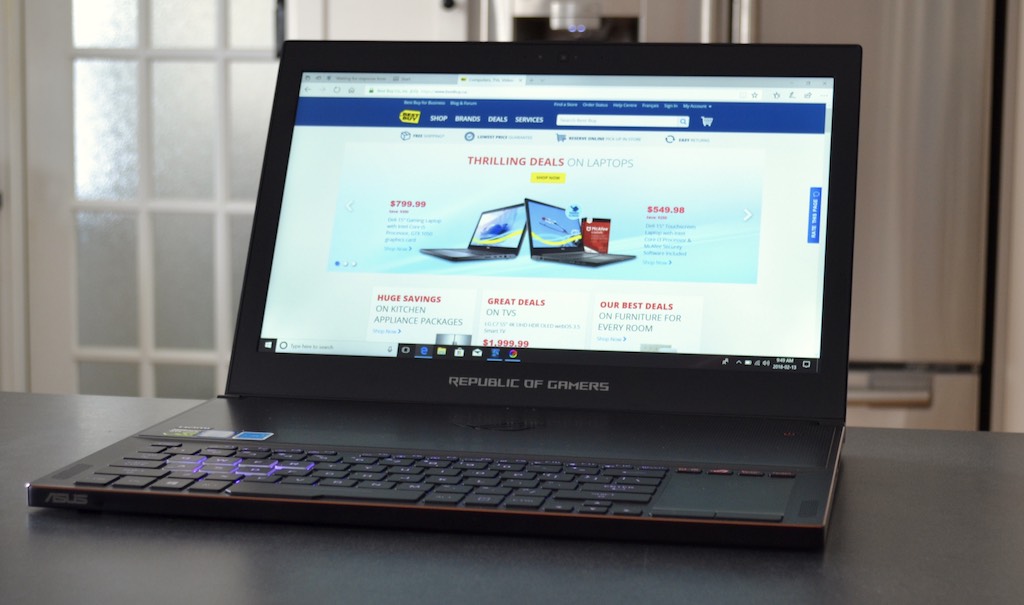
When it comes to ultra high performance laptops—the kind of machine that can actually take on a desktop PC in terms of processing power and graphics capabilities—there are several obvious choices. Professional users tend to gravitate to the MacBook Pro, and Microsoft is winning over converts with its Surface Book. But there’s an entire class of portables that’s often overlooked despite having specs that more than meet the needs: gaming laptops.
That’s right, gaming laptops aren’t just for gaming …
Power to spare
The key reason for choosing a gaming laptop if you are power user is the performance on tap. Most laptops are designed to offer a slim design, long battery life and an affordable price. That means components that are power efficient and usually skipping expensive options like a discrete video card.
A gaming laptop is designed from the ground up to make gaming possible in a portable form factor. And gaming ranks right up there as one of the most demanding tasks for a computer. So a gaming laptop will usually be packed with components like a quad-core Intel Core i7 CPU, a graphics card with dedicated video RAM and lots of high speed RAM. Most also offer a combination of high speed SSD storage and a high capacity HDD for those huge video game installs.
Great for gaming, but this combo will also make a killer performance laptop. You’ll be able to crunch spreadsheets, compile 4K video and work with 3D modelling software without blinking. And there will be tons of storage for big multimedia files.
Premium display
Most gaming laptops these days don’t offer 4K resolution and few (if any) include touch support. But Full HD is the standard, and that is an optimal size for viewing content on a display that tops out at 17-inches. If you want to go bigger, most will support 4K on a connected external 4K display.
But that built-in display will be a treat to use. Gaming laptops put a lot of emphasis on the display quality. Expect high refresh rates, low glare and great viewing angles. Most gaming laptops pair that display with premium audio as well.
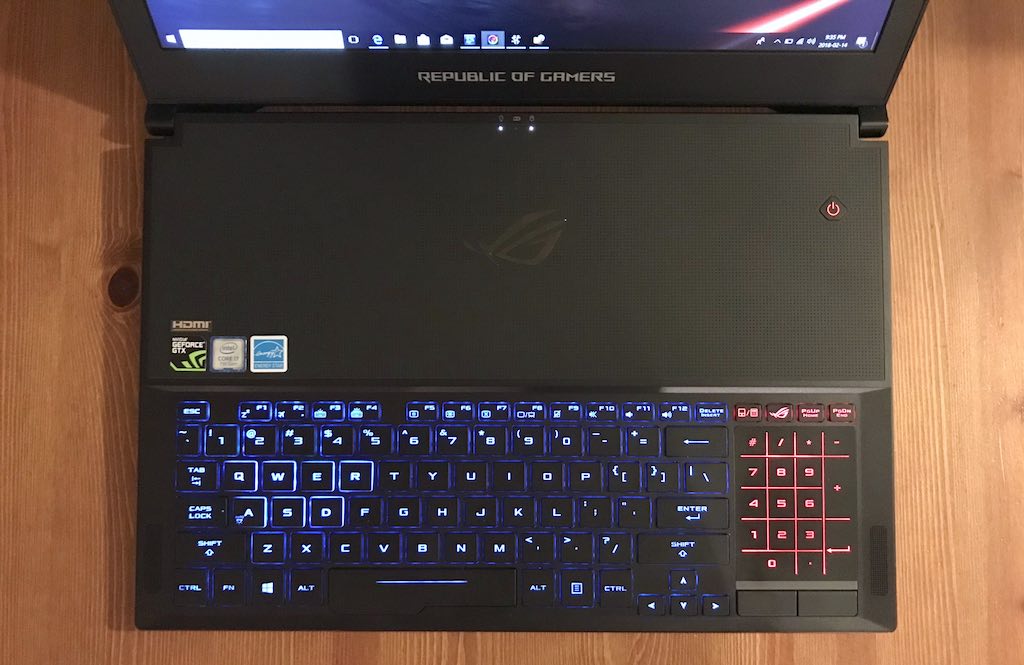
Gaming-optimized keyboard is very useful
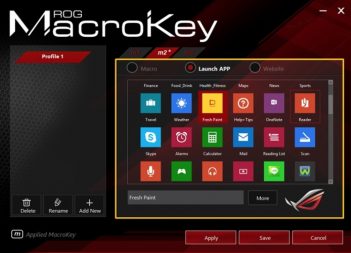 A good keyboard is important for productivity. And gaming keyboards tend to come equipped with keyboards that are better than you’ll find on the average laptop. Expect to see features like longer travel, better feedback, backlighting (often fully customizable) and support for time-saving macros. Larger gaming laptops (15-inches and up) typically have a full-sized keyboard with isolated number keys, which is handy for data entry.
A good keyboard is important for productivity. And gaming keyboards tend to come equipped with keyboards that are better than you’ll find on the average laptop. Expect to see features like longer travel, better feedback, backlighting (often fully customizable) and support for time-saving macros. Larger gaming laptops (15-inches and up) typically have a full-sized keyboard with isolated number keys, which is handy for data entry.
A full complement of ports
One of the big complaints about laptops is that they lack ports, or they don’t have the right mix of ports. Apple is in the crosshairs on this one. The MacBook has a single port, it’s USB-C, and it’s also used for power. The new MacBook Pro laptops have more ports, but they’re all USB-C. Forward thinking, but it ignores the reality that many power users have a collections of accessories that use standard USB connections.
Gaming laptops tend to offer an unrivalled number of connectivity options. At a minimum, expect HDMI, multiple USB ports and Ethernet. Many of the gaming laptops I’ve reviewed lately add Mini DisplayPort and a USB-C port in the mix as well, and an SD card slot.
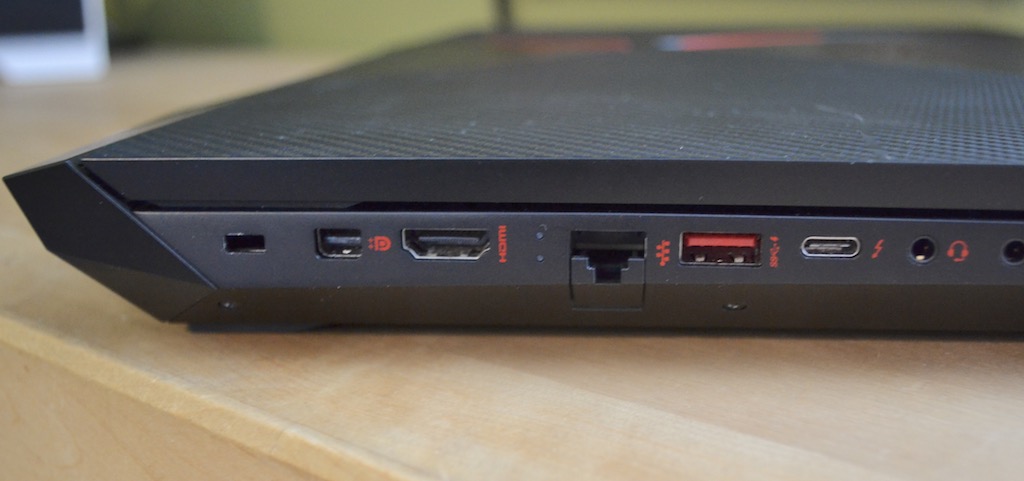
If you want to connect multiple accessories, connect to a high speed wired network or connect an external monitor, it’s hard to beat a gaming laptop for the number of options offered.
Expandability, a rarity in laptops
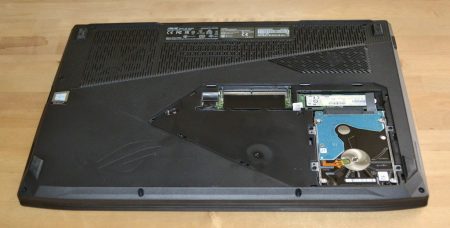 One of the primary things you give up with a laptop compared to a desktop is expandability. Especially the current generation of ultra-slim laptops, where even the RAM is soldered permanently to the motherboard. That means if you buy one of these and decide a few years from now that you need more storage or memory, you may be out of luck.
One of the primary things you give up with a laptop compared to a desktop is expandability. Especially the current generation of ultra-slim laptops, where even the RAM is soldered permanently to the motherboard. That means if you buy one of these and decide a few years from now that you need more storage or memory, you may be out of luck.
Many gaming laptops not only have upgradable RAM and storage, they make it easy to do so with a panel that gives quick access to these components. Some even offer multiple drive options, so you can keep an installed SSD and replace the mass storage HHD with additional solid state storage. Or pop out a drive and go with increased capacity. You may never need to—gaming laptops tend to come pretty well equipped out of the box—but the option is usually there.
What are you giving up by choosing a gaming laptop?
Most gaming laptops tend to ship with a Full HD resolution display, so if you were looking for 4K your choice are limited. The bigger issue is size. Overall size varies depending mainly on display size, so there are small gaming laptops and big ones to choose from. However, they are almost all considerably bulkier and heavier than a typical laptop with a similar display size. That’s just a reality of packing performance components and cooling into a portable form factor. Some gaming laptops can also be quite flashy with aggressively sculpted cases and LED light shows. Cool, yes, but you may not be comfortable cracking one of these open in a business meeting scenario.
However, the boat anchor size and flashy appearance aren’t an issue with all gaming laptops. I recently reviewed the ASUS ROG Zephyrus and that is a gaming laptop that is sleek, sophisticated and stylish. Despite having an incredible amount of processing and graphics power on tap (a Core i7 and Nvidia GeForce GTX 1080) the ROG Zephyrus is only 17.9 mm at its thickest point, and weighs just 2.2 kg.
But … It suffers from the other thing you will always give up with a gaming laptop compared to a traditional laptop: battery life. If you primarily use a laptop on a desk as a workstation, no issue. If you need a high powered laptop that can be used as a truly mobile computer, including away from an electrical outlet, the 15.6-inch MacBook Pro gets about 10 hours of battery life, while you’d be lucky to get two hours on the ROG Zephyrus.
Clearly, there are still decisions to be made. Fortunately, Best Buy carries all the latest high performance laptops, business laptops and gaming laptops, so you can compare. And the Plug-in blog regularly publishes hands-on reviews of laptops from all classes to help when it’s time to choose.



